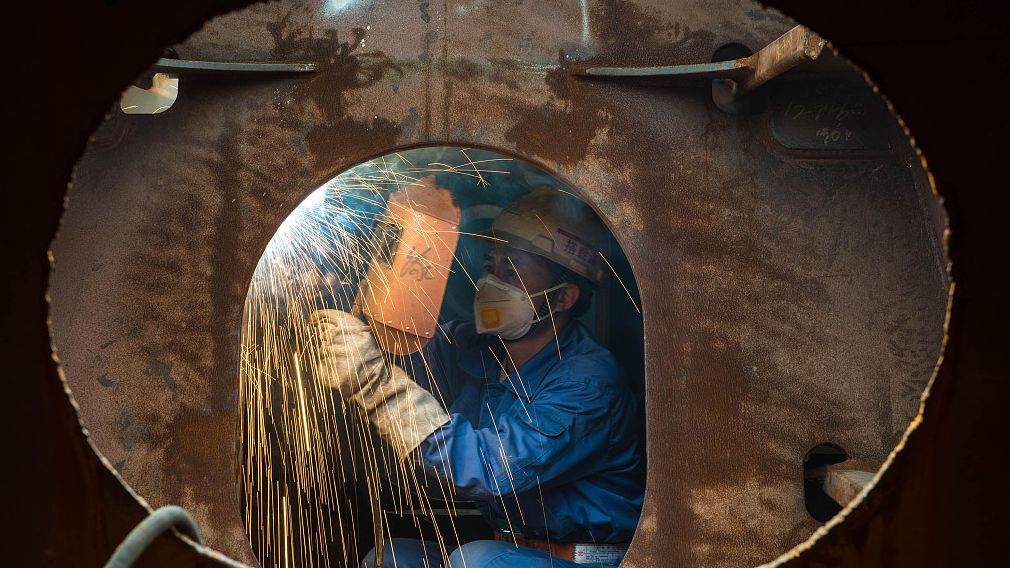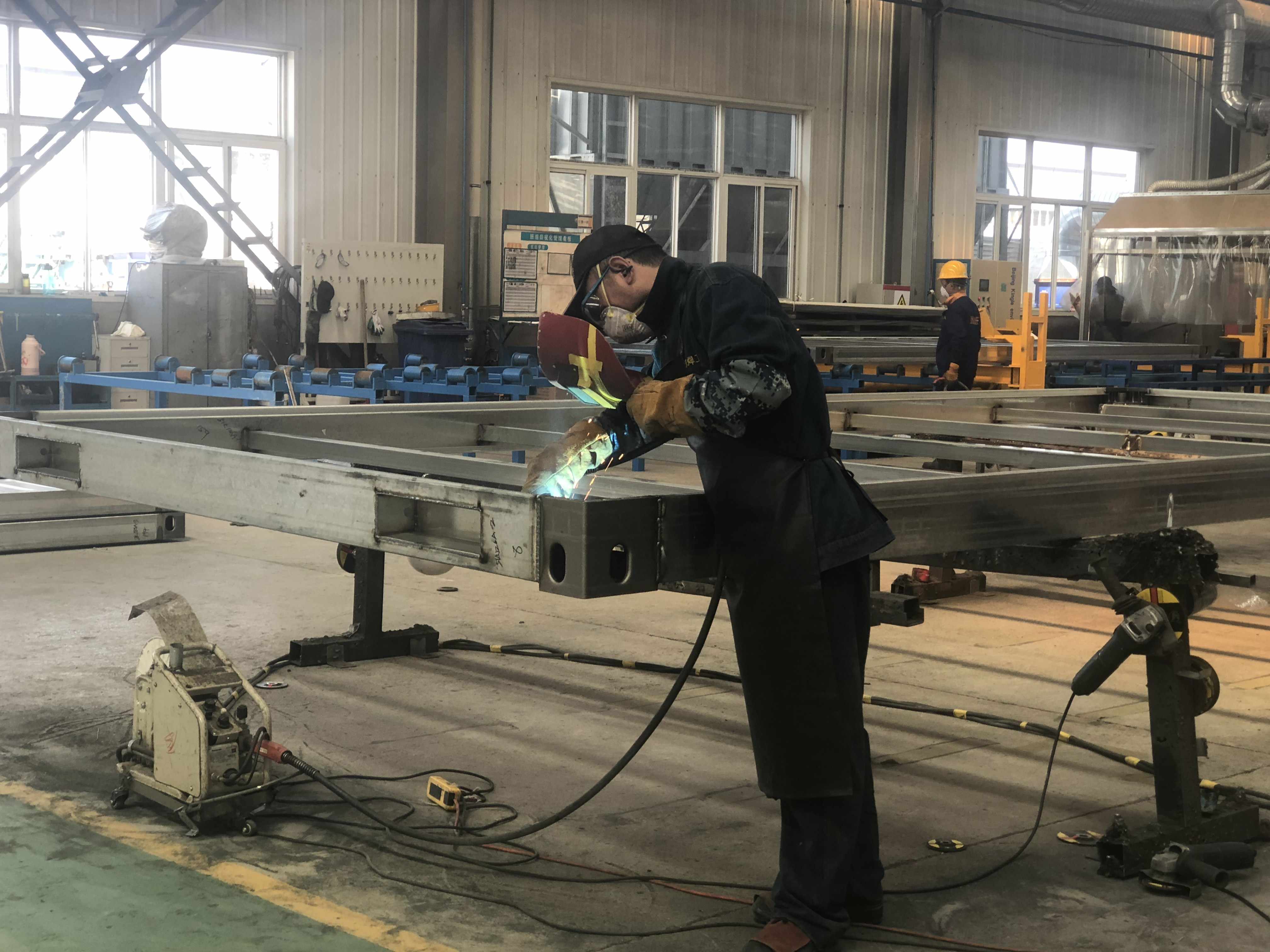
Domestic
13:18, 10-May-2019
How do factories in China cope with an exodus of young laborers?
Updated
18:58, 10-May-2019
By Yu Jing

At midnight, when most people in the city were sleeping, Wang Zitong, then a mere 17 years old, was still working along the assembly line.
The factory he worked for, located in the Yantai Economic Development Zone of east China's Shandong Province, belonged to South Korean electronics manufacturer LG.
While soldering circuit boards, even with a paper mask, he could sense the strong sour smell of molten lead. Sometimes when he was too sleepy to concentrate, he would burn his fingers.
Wang's story of exhaustion is echoed by many factory workers in China. Enticed by the supposed glamor and freedom of urban life, many left their rural homes and went to the cities.
Once known for its labor-intensive manufacturing, China is now struggling to recruit factory workers among the younger generation.
"Life is short, why not do what you like?"
By the time I met Wang Zitong, he had already quit his job and became a fitness trainer at a studio at the heart of Beijing's CBD. He worked at the LG factory for one year and three months. By the time he left, only two people out of 20 employees on his assembly line had not quit.

Wang Zitong in his fitness studio in Beijing. /CGTN Photo
Wang Zitong in his fitness studio in Beijing. /CGTN Photo
To be fair, the pay at the factory was not bad, Wang said. He had a monthly salary of 3,500 yuan (515 U.S. dollars), a decent amount in a small town in Yantai in 2013.
The factory fed him, and gave him a bed in a dorm. After his night shift, he went to the factory's canteen to get bread and milk for breakfast. Fruit was also available.
"But the nightshifts are too harmful to one's health. I could bear it for one year, but if it had been for a few more years, I would have had a mental breakdown," said Wang. He then asked me rhetorically, "Life is short, why not do what you like?"
Since the 1980s, factory workers have been the main force behind China's breakneck economic growth. But as the younger generation came to dominate the job market, the old norm does not apply any longer.
Rather than money, young people value time and freedom. They want time for themselves, and time to socialize.
The labor exodus from factories also reflects a bigger transition in the country's economy. Since 2011, the service sector has been the country's largest source of job creation, accounting for 35.7 percent of positions, according to data from the National Bureau of Statistics (NBS).
In recent years, the rapid development of the online sector has attracted much of the nation's young talent, particularly among the ride-hailing and food delivery industries.
A 2018 report by China's leading food delivery platform Meituan Dianping shows that 31 percent of the company's food delivery couriers were previously factory workers, and the major reasons for their change of career were "flexible work schedule" and "no delay in getting payment."
The changing face of working in manufacturing
34-year-old Zhang Hao is stick thin and deeply tanned. With a beaming smile and a red cartoon baseball hat, he could pass for someone still in his twenties.
He is in his fourth year of working at the Tianjin factory of Beijing Chengdong International Modular Housing Corporation. Though now the head of the welding team, he was disillusioned by factory life early in his career.
In 2011, when he was 26 years old, he began working along an assembly line for a shipbuilder in eastern Jiangsu Province as a welder. "My work was counted in minutes, while my rest time was counted in seconds," said Zhang. "I felt exhausted every day."

Zhang Hao in his work uniform. /CGTN Photo
Zhang Hao in his work uniform. /CGTN Photo
His new job, unlike working on an assembly line, involves cooperating with other workers. He can decide the pace at which he finishes the task, as long as the total amount of tasks per day is achieved. And if he needs to ask for leave, he can just give his boss a call.
The improvement is partly a result of the changing nature of his job, and partly a move by his employer.
Zhang Guoyong, the deputy general manager of the company, said it was committed to creating better conditions for the workers. "What we want to promote is to work with initiative, and to work with a positive attitude."
After hearing complaints that the food was bad, the company hired new chefs in the kitchen. Aware that some employees complained there was little to do with one's free time in the destitute economic zone, the company organized excursions. Earlier this month, it hired a bus for employees who wanted to go shopping in the nearest town.

A welder at work in a factory in Tianjin, north China. /CGTN Photo
A welder at work in a factory in Tianjin, north China. /CGTN Photo
Offering a higher salary is of course also key to retaining employees. NBS data show that salaries of technical workers and assembly line laborers in factories increased significantly from 2013 to 2017, from 38,243 yuan to 49,354 yuan per year.
How can the manufacturing industry respond?
But it is inevitable that young workers will continue to leave factories en masse.
Since earnings for factory workers are calculated on the basis of their workload, off-peak periods when orders are low tend to see workers hop between factories, as they chase positions which offer the highest pay packages.
"I told the junior workers that a shortage of orders is temporary, and that the situation will improve soon," said Zhang Hao, referring to a recent batch of junior workers who left the company earlier this year. "But I cannot force them to stay."
To prevent any downturns caused by the labor shortfall, companies have been promoting a higher degree of automation.
According to data from the International Federation of Robotics, China had 97 robots per 10,000 manufacturing employees in 2017, ahead of the global average of 85.

A junior worker observes how a senior technician works in the factory. /CGTN Photo
A junior worker observes how a senior technician works in the factory. /CGTN Photo
Increased automation would be a boon for workers, said Zhang Guoyong. Now, because of the labor shortfall, it was middle-aged people in their 40 and 50s that were hauling heavy metal on and off trucks. Automation can help make their lives easier.
But to be prepared for a more automation-driven manufacturing sector, requirements for laborers to have stronger skills will increase.
People with technical prowess and IT know-how are the most desired. The 2018 Blue Paper on the Employment Situation of College Graduates shows that IT positions in manufacturing industries increased by 4.3 percent for college graduates and 2.2 percent for graduates from vocational schools.
"Previously you were a welder, now you would become the supervisor of the welder robot," Zhang Guoyong said. The company recently decided to invest around 1 million yuan (149,200 U.S. dollars) into installing robot welders in the factory.
As China's manufacturing industry shifts to a more tech-based model rather than a labor-intensive system, the image of a factory worker will change accordingly.
"In the past, you only had to know how to weld. Now you have to know how to code," Zhang concluded.

SITEMAP
Copyright © 2018 CGTN. Beijing ICP prepared NO.16065310-3
Copyright © 2018 CGTN. Beijing ICP prepared NO.16065310-3